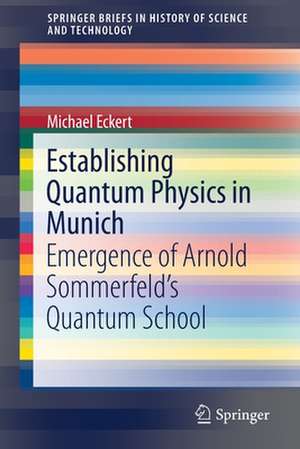Establishing Quantum Physics in Munich: Emergence of Arnold Sommerfeld’s Quantum School: SpringerBriefs in History of Science and Technology
Autor Michael Eckerten Limba Engleză Paperback – 16 dec 2020
The book is part of a series of publications on the early network of quantum physics. These works emerged from an expansive study on the quantum revolution as a major transformation of physical knowledge undertaken by the Max Planck Institute for the History of Science and the Fritz Haber Institute (2006–2012). For more on this project, see the dedicated Feature Story, The Networks of Early Quantum Theory, at the Max Planck Institute for the History of Science, https://www.mpiwg-berlin.mpg.de/feature-story/networks-early-quantum-theory
Din seria SpringerBriefs in History of Science and Technology
- 8%
 Preț: 387.77 lei
Preț: 387.77 lei -
 Preț: 377.18 lei
Preț: 377.18 lei -
 Preț: 443.75 lei
Preț: 443.75 lei -
 Preț: 377.35 lei
Preț: 377.35 lei -
 Preț: 377.35 lei
Preț: 377.35 lei -
 Preț: 378.34 lei
Preț: 378.34 lei -
 Preț: 379.09 lei
Preț: 379.09 lei -
 Preț: 378.54 lei
Preț: 378.54 lei -
 Preț: 378.34 lei
Preț: 378.34 lei -
 Preț: 377.73 lei
Preț: 377.73 lei -
 Preț: 448.21 lei
Preț: 448.21 lei -
 Preț: 377.35 lei
Preț: 377.35 lei -
 Preț: 408.66 lei
Preț: 408.66 lei -
 Preț: 478.33 lei
Preț: 478.33 lei - 20%
 Preț: 296.67 lei
Preț: 296.67 lei -
 Preț: 411.16 lei
Preț: 411.16 lei -
 Preț: 374.30 lei
Preț: 374.30 lei -
 Preț: 379.09 lei
Preț: 379.09 lei -
 Preț: 489.30 lei
Preț: 489.30 lei -
 Preț: 378.54 lei
Preț: 378.54 lei -
 Preț: 378.92 lei
Preț: 378.92 lei - 15%
 Preț: 461.87 lei
Preț: 461.87 lei -
 Preț: 442.83 lei
Preț: 442.83 lei -
 Preț: 446.08 lei
Preț: 446.08 lei -
 Preț: 379.48 lei
Preț: 379.48 lei -
 Preț: 379.86 lei
Preț: 379.86 lei -
 Preț: 344.53 lei
Preț: 344.53 lei -
 Preț: 378.92 lei
Preț: 378.92 lei -
 Preț: 376.04 lei
Preț: 376.04 lei -
 Preț: 347.41 lei
Preț: 347.41 lei -
 Preț: 324.70 lei
Preț: 324.70 lei -
 Preț: 377.35 lei
Preț: 377.35 lei -
 Preț: 444.35 lei
Preț: 444.35 lei
Preț: 476.57 lei
Nou
Puncte Express: 715
Preț estimativ în valută:
91.19€ • 95.45$ • 75.90£
91.19€ • 95.45$ • 75.90£
Carte tipărită la comandă
Livrare economică 31 martie-14 aprilie
Preluare comenzi: 021 569.72.76
Specificații
ISBN-13: 9783030620332
ISBN-10: 3030620336
Pagini: 86
Ilustrații: XIV, 86 p. 1 illus.
Dimensiuni: 155 x 235 mm
Greutate: 0.15 kg
Ediția:1st ed. 2020
Editura: Springer International Publishing
Colecția Springer
Seria SpringerBriefs in History of Science and Technology
Locul publicării:Cham, Switzerland
ISBN-10: 3030620336
Pagini: 86
Ilustrații: XIV, 86 p. 1 illus.
Dimensiuni: 155 x 235 mm
Greutate: 0.15 kg
Ediția:1st ed. 2020
Editura: Springer International Publishing
Colecția Springer
Seria SpringerBriefs in History of Science and Technology
Locul publicării:Cham, Switzerland
Cuprins
Chapter 1. Introduction.- Chapter 2. Boltzmann’s Legacy.- Chapter 3. Munich Beginnings.- Chapter 4. X-rays and Quanta, 1911–1913.- Chapter 5. Extending Bohr’s Model, 1914–1919.- Chapter 6. Synergy and Competition in the Quantum Network, 1919–1925.- Chapter 7. Wave Mechanics—A Pet Subject of the Sommerfeld School, 1926–1928.- Appendix.
Notă biografică
Michael Eckert is a German physicist and science historian at the Deutsches Museum in Munich. He studied physics at the Technical University of Munich, graduating in 1976, and was awarded a doctorate in theoretical physics (models for the visual processes of invertebrates) at the University of Bayreuth in 1979. From 1981 to 1988, he worked at the Deutsches Museum, and from 1989 to 1995 was a lecturer at the Bayerischer Schulbuchverlag. From 1995 to 2000, he was a research associate at the Ludwig-Maximilians-Universität in Munich and since 2001 has been working at the Research Institute for the History of Technology and Science at the Deutsches Museum. Eckert published a biography of Arnold Sommerfeld (and organized an exhibition about him at the Deutsches Museum), wrote a book about the Sommerfeld School of Atomic Physics and about the history of fluid mechanics, especially the school of Ludwig Prandtl, and dealt, among other things, with the history of solid-state physics and nuclear energy policy in Germany.
Caracteristici
Sheds light on the institutional network that supported the rise of quantum mechanics Illustrates the local character of knowledge production Portrays the quantum pioneers from the perspective of research schools
